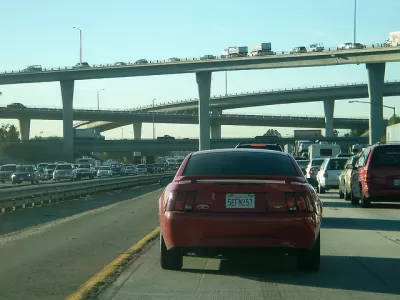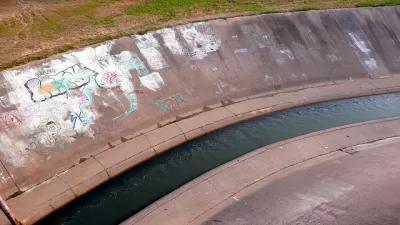Opposition mobilized quickly after the Trump Administration released its long-awaited infrastructure plan. There's even a hashtag.

The first reports of the Trump Administration's long-awaited infrastructure plan started hitting the wire over the weekend, when White House officials briefed reporters on the details of a forthcoming infrastructure plan. More news and official documents followed on Monday. But it wasn't long until the news started shifting to analysis, and most of that analysis was not kind to the Trump Administration's long awaited infrastructure plan. (The "Legislative Outline for Rebuilding Infrastructure in America" and the "Efficient, Effective, Accountable: An American Budget" are both available in full online.)
Matthew Yglesias put out an "explainer" post that is very clear in its criticisms of the financing structure proposed by the plan. According to Yglesias, Trump's plan lacks the debt financing that has worked for Republican initiatives in the past, thus creating a recipe for gridlock and inaction. Yglesias writes that Trump, "[proposes] some new spending to position himself as favoring action, while insisting that the spending be offset with spending cuts elsewhere in the budget while also not specifying which spending should be cut…"
Angie Schmitt calls out the plan as a "con" in an unflinching critique of the plan. Two lines of argument are particularly noteworthy from Schmitt's critique. First is the plan's attack on federal transit spending:
The administration plans to siphon resources from federal transit programs, which Trump singled out for cuts in his 2019 budget proposal [pdf], also released today. The budget calls for axing $3.7 billion for New Starts, the major source of federal funding for transit expansion projects.
All told, the Trump budget proposal would “cut more than $168 billion of Federal highway, transit, Amtrak, and water infrastructure funding over the next 10 years,” according to Representative Peter DeFazio, an Oregon Democrat and the ranking member of the House infrastructure committee.
Second, Schmitt raises the point to be wary of headlines and articles pitching the plan as a $1.5 trillion package. That lofty dollar figure is "smoke and mirrors," according to a source quoted by Schmitt. The same point has since been made by Laura Bliss for CityLab.
An article by John Wagner relates the back and forth between the Trump Administration and Senator Chuck Schumer (D-NY) after the senator strongly criticized the plan. Erin Baldassari surveyed politicians from the San Francisco Bay Area and found them underwhelmed, to say the least, with the plan. Grace Segers also provides regional analysis of the potential consequences of the plan, focusing on New York. Analysis by Julie Hirschfeld Davis suggests the infrastructure plan faces long odds from an apathetic Congress.
For another thread in the critical coverage of Trump's infrastructure plan, see articles by Leanna Garfield and Coral Davenport, which notes that the plan completely fails to account for climate change mitigation or adaptation (coverage by Planetizen correspondent Irvin Dawid provides more info on the Trump Administration's track record with climate change).
Concluding with the strongest possible terms used in criticisms of the proposed plan, the word "scam" is being widely deployed in response to Trump's infrastructure schemes. An article for the BBC, with analysis by Anthony Zurcher, notes that the opposition is calling out the plan as a scam and lays out even more criticisms fo the plan (such as the argument that the plan will "privatise the nation's infrastructure"). Katrina vanden Heuvel also publishes a harshly critical column focusing on the potential for privatization. Then there a lot of people speaking out against the plan on Twitter, #InfrastructureScam.
If you're not a fan of this plan or Trump's proposed budget, maybe wash down all these criticisms with a post by Heather Timmons that points out the gulf between Trump's proposed budget last year and the budget that Congress eventually adopted.
For those keeping track at home, here's a list of the specific criticisms of Trump's infrastructure plan:
- The plan is pitched as a $1.5 trillion (to $1.7 trillion) plan but only spends $200 million.
- The plan is unrealistic about the likelihood of receiving any of the funding it promises if set up the way the Trump Administration suggests.
- The plan will privatize much of the nation's infrastructure (e.g., water as well as transportation).
- The plan and the budget cut funding for public transit.
- The plan and the budget ensure priority for harmful and inefficient road projects.
- The plan and the budget represent a cut in overall infrastructure spending.
- The plan fails to account for climate change adaptation or mitigation.
- The plan lacks the necessary political support to pass.
Though there's very little reason to think this plan might pass in its original form, even in increments this proposal does nearly begin to suggest the kinds of reforms needed to repair and rebuild the nation's infrastructure. Unfortunately, with the leadership in Washington, D.C. right now, reforms will have to commence after rejecting the privatization schemes and funding cuts included in this plan. We simply cannot allow the ongoing cycle of inequality and environmental destruction to continue, and this plan would in fact further entrench many of the fundamental failures of this country's approach to infrastructure. The field of planning throughout the 21st century was complicit in building the systems failing society now, and it's far past time that planners take a leadership role in shifting the nation's investments toward more socially inclusive and environmentally regenerative outcomes.

Planetizen Federal Action Tracker
A weekly monitor of how Trump’s orders and actions are impacting planners and planning in America.

Restaurant Patios Were a Pandemic Win — Why Were They so Hard to Keep?
Social distancing requirements and changes in travel patterns prompted cities to pilot new uses for street and sidewalk space. Then it got complicated.

Map: Where Senate Republicans Want to Sell Your Public Lands
For public land advocates, the Senate Republicans’ proposal to sell millions of acres of public land in the West is “the biggest fight of their careers.”

Maui's Vacation Rental Debate Turns Ugly
Verbal attacks, misinformation campaigns and fistfights plague a high-stakes debate to convert thousands of vacation rentals into long-term housing.

San Francisco Suspends Traffic Calming Amidst Record Deaths
Citing “a challenging fiscal landscape,” the city will cease the program on the heels of 42 traffic deaths, including 24 pedestrians.

California Homeless Arrests, Citations Spike After Ruling
An investigation reveals that anti-homeless actions increased up to 500% after Grants Pass v. Johnson — even in cities claiming no policy change.
Urban Design for Planners 1: Software Tools
This six-course series explores essential urban design concepts using open source software and equips planners with the tools they need to participate fully in the urban design process.
Planning for Universal Design
Learn the tools for implementing Universal Design in planning regulations.
Heyer Gruel & Associates PA
JM Goldson LLC
Custer County Colorado
City of Camden Redevelopment Agency
City of Astoria
Transportation Research & Education Center (TREC) at Portland State University
Camden Redevelopment Agency
City of Claremont
Municipality of Princeton (NJ)






























